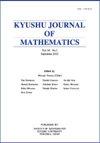OKADA'S THEOREM AND MULTIPLE DIRICHLET SERIES
IF 0.5
4区 数学
Q3 MATHEMATICS
引用次数: 3
Abstract
Let k1, . . . , kr be positive integers. Let q1, . . . , qr be pairwise coprime positive integers with qi > 2 (i = 1, . . . , r ), and set q = q1 · · · qr . For each i = 1, . . . , r , let Ti be a set of φ(qi )/2 representatives mod qi such that the union Ti ∪ (−Ti ) is a complete set of coprime residues mod qi . Let K be an algebraic number field over which the qth cyclotomic polynomial 8q is irreducible. Then, φ(q)/2r numbers r ∏ i=1 dki−1 dzi i (cot π zi )|zi=ai /qi (ai ∈ Ti , i = 1, . . . , r) are linearly independent over K . As an application, a generalization of the Baker–Birch– Wirsing theorem on the non-vanishing of the multiple Dirichlet series L(s1, . . . , sr ; f ) with periodic coefficients at (s1, . . . , sr )= (k1, . . . , kr ) is proven under a parity condition.冈田定理和多重狄利克雷级数
设k1。, kr是正整数。让q1…, qr是具有qi > 2 (i = 1,…)的成对素数正整数。, r),令q = q1···qr。对于每个i = 1,…, r,设Ti是φ(qi)/2个代表模qi的集合,使得并集Ti∪(−Ti)是模qi的素数残数的完备集。设K是一个代数数域,在这个代数数域上,第K个环多项式8q是不可约的。则φ(q)/2r数r∏i=1 dki−1 dzi i (cot π zi)|zi=ai /qi (ai∈Ti, i=1,…, r)在K上线性无关。作为一个应用,推广了Baker-Birch - Wirsing定理关于多重Dirichlet级数L(s1,…)的不灭性。, sr;F)周期系数在(s1,…), sr)= (k1,…, kr)是在宇称条件下证明的。
本文章由计算机程序翻译,如有差异,请以英文原文为准。
求助全文
约1分钟内获得全文
求助全文
来源期刊
CiteScore
0.80
自引率
0.00%
发文量
10
审稿时长
>12 weeks
期刊介绍:
The Kyushu Journal of Mathematics is an academic journal in mathematics, published by the Faculty of Mathematics at Kyushu University since 1941. It publishes selected research papers in pure and applied mathematics. One volume, published each year, consists of two issues, approximately 20 articles and 400 pages in total.
More than 500 copies of the journal are distributed through exchange contracts between mathematical journals, and available at many universities, institutes and libraries around the world. The on-line version of the journal is published at "Jstage" (an aggregator for e-journals), where all the articles published by the journal since 1995 are accessible freely through the Internet.

 求助内容:
求助内容: 应助结果提醒方式:
应助结果提醒方式:


